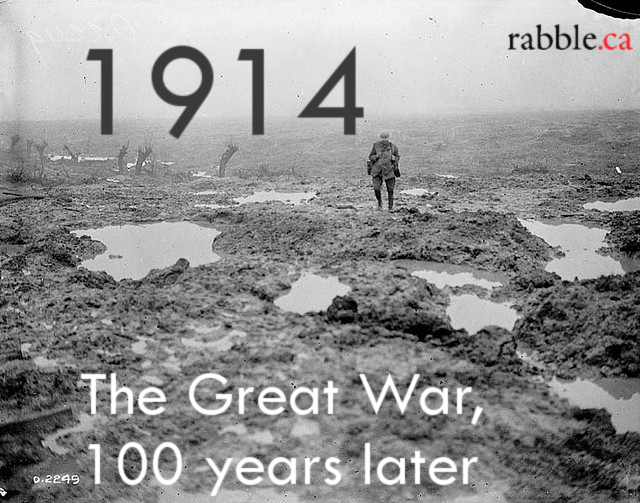Strip away all the talk of glory and heroism and making the world safe for democracy and what remains is how each side in a war is murdering the other while itself committing suicide. Except that every so often, in small ways, ordinary human decency breaks through, and lingers on in the collective memory.
In the First World War, the memorable moment is the joint celebration by British and German soldiers of Christmas 1914 in the no man’s land between the trenches. It made the news last Christmas, a hundred years later. The men in charge of the war, the politicians and the generals, were enraged by this spontaneous outburst of shared affection. Yet in the Christmas coverage on the centennial I don’t recall anything but wonderment and praise at this expression of anti-war sentiment.
A sentiment rarely praised during war, an activity that questioned everything that was happening every other day, it somehow seemed sensible and good.
The Christmas truce did not happen again, though there were cases of gifts of food being exchanged — British bully beef and preserves for German beer and cigars. But historians tell us that what did happen throughout the war — more so than usual, perhaps because of the closeness of the two sides in the trenches and the quick descent into endless stalemate and gridlock — was live-and-let-live behaviour. One historian calls them “tacit truces [which] rested on informal, unspoken understandings.” Restraint in firing, letting “them” gather their wounded, conflict avoidance, tacit co-operation, mutual empathy, reciprocal self-interest, turning a blind eye, on a day-to-day basis on both sides by soldiers on the ground.
Indeed, it can be understood as rational behaviour when assessed in terms of today’s game theory. It’s a tit-for-tat co-operative strategy in a situation where soldiers on both sides feel trapped and must kill or be killed. It is an example of the prisoners’ dilemma — albeit simplified — where two prisoners held separately end up mutually better off if they refuse to squeal on each other.
As the ethicist Jonathan Glover writes in his thoughtful book Humanity: A Moral History of the Twentieth Century: tit-for-tat “provided a way for both sides to co-operate rationally to minimize the severity of the trap in which they all found themselves.” It couldn’t end the war — for that the much more serious act of mutual mutiny, a laying down of arms by both sides would be necessary — but it could make the reign of terror, what passed for living in the trenches, less of a hazard, more tolerable, which is a good unto itself. Do good at the moment even if it yields no further good.
Some commentators think that what made war more bearable, therefore prolonged it, but it is hard to follow their logic. Some restraint in killing was just that. Widely practiced, it did not alter the balance of forces and did not change the existing stalemate. Its sole merit it that it lessened pointless casualties.
Nor, as already noted, did it help to end the war, to hasten the peace. “Some shots were not fired,” writes Glover. “Some wounded men were saved. But mutual respect and sympathy were powerless to stop the war.” Given the carnage, the mutually assured destruction of an earlier time, it “would have been in the interests of the troops on both sides to have agreed to refuse to fight.” But there really was no way that could happen or be allowed to happen. So the irrational wins. Morality is defeated.
Nevertheless, there were those small burstings forth of the rational in the slime of the irrational. “If we allow the enemy breakfast in peace,” thinks one side, “they will do the same for us.” “If I don’t see their sentry, they won’t see me.” “If you throw shells at our trenches, we’ll get your range and do the same.” One British soldier described things this way: “Without at all ‘fraternizing’ we refrain from interfering with Brother Bosch seventy yards away, as long as he is kind to us.”
As the war proceeded, however, with no end in sight and mountains of body parts on both sides, resignation and stoicism spread, and live-and-let live fell off. But the better angels of our nature, having manifested themselves, never wholly disappeared.
It has been estimated that up to one third of British units engaged in live-and-let-live behaviour. It is likely that is more or less the same for the Germans. The British thought that French and Italian troops were more inclined to such behaviour that they were.
Harsh military training, rituals to routinize obedience, severe discipline, like sending those who flinch in the midst of the mutual massacre to the firing squad, minimize such decency but cannot wholly eliminate it. But did we not sense that, know that, understand that, without a war to prove it?




